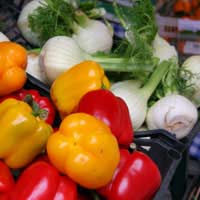Fresh or Frozen Food: Which is Best?

Both fresh and frozen food, especially fruit and vegetables, are now so easy to get hold of, but which is better – fresh or frozen?
The Advantages of Fresh Food
Fresh fruit and vegetables often taste better than frozen ones, and can have a better texture. Some fruit and vegetables cannot be frozen, such as salad vegetables like lettuce.It’s easier to find out where fresh food is produced, and fresh food can be sourced locally, for example from farmer’s markets, or direct from the producer. It can be easier to buy organic fresh food than organic frozen food.
Fresh fruit and vegetables that are harvested locally and eaten as soon as possible after picking are as healthy and nutritious as frozen vegetables.
The packaging for fresh fruit and vegetables can be minimal, especially if bought from markets.
The Disadvantages of Fresh Food
Fresh food takes longer to prepare, and any food not cooked straight away has to be used within a few days. Preparing fresh fruit and vegetables creates a lot of peelings and trimmings (but these can be composted).The nutrient levels in fresh food, especially fresh fruit and vegetables, decline after a few days of storage.
The Advantages of Frozen Food
In the UK, on average, people throw away about one third of the food that they buy. By using frozen fruit and vegetables and frozen, pre-prepared meat, people can use only the amount required and return the rest to the freezer, which could mean less waste than with fresh food. Frozen food also helps with planning meals in advance.If food is frozen straight after harvest, it can retain more nutrients than stored fresh food. For example, fresh peas can lose 10-20% of their vitamin C within one day of harvesting.
Frozen food generally needs less preparation than fresh food, and produces fewer trimmings and other waste. The freezing process means that the food (especially fruit and vegetables) take less time to cook, potentially reducing energy use.
Frozen food is often cheaper than fresh food. Food can be frozen in season and then eaten out of season without having to rely on shipping from overseas. Stocking up the freezer can mean fewer trips to the shops, reducing car use, and buying frozen food in bulk can mean less packaging.
Frozen vegetables can be cheaper than fresh vegetables.
The Disadvantages of Frozen Food
Storing frozen food requires more energy than storing fresh food.Frozen fruit and vegetables can’t usually be eaten raw, as the freezing process breaks down the cells – for example, a frozen strawberry or raspberry still tastes good, but loses its shape and texture.
Five a Day
Both frozen and fresh fruit and vegetables count as part of the recommended five portions of fruit and vegetables a day.In Conclusion
Fresh and frozen food have a number of advantages and disadvantages. Fresh food often tastes better, but frozen food, especially fruit and vegetables, is more convenient and can be cheaper with a wider choice out of season. So, in the end, the choice is yours!- Healthy Snacks for Kids
- Choosing Healthy Foods for Kids When Eating Out
- Nutrition and Allergies
- The Effects of Caffeine
- Vital Vitamins for a Child
- Vegetarianism and Growing Kids
- Dangers of Additives
- Ensure Your Child is Getting "Five-a-Day"
- Fun, Healthy Recipes
- Healthy Fruit Shakes and Smoothies
- Kicking a Junk Food Habit
- Quick and Healthy Recipes For Kids to Eat
- Get Your Kids Cooking
- Healthy Packed Lunches
- Healthy Recipes to Cook with Kids
- Vegetable Gardening with Kids

Re: Superfoods on a Budget
I just checked out these fantastic tips for buying superfoods on a budget! Eating healthy doesn’t have to be expensive. Can’t wait to try…
Re: Fun Facts: How Many Calories Does a Child Burn?
hi, im eleven yrs. I weigh about 100 lbs and believe I am over the normal weight. I am about 4’10 ft. I…
Re: Fun Facts: How Many Calories Does a Child Burn?
I want to clear this up for everybody worried about their weight, especially at a young age you shouldn’t…
Re: Dealing with a Child that is Always Hungry
I am the great grandmother of an 8 year old that I mostly take care of her mom is around but she totally depends…
Re: Fun Facts: How Many Calories Does a Child Burn?
I’m 11 years old and recently got a smart watch. This isn’t a big question but I can’t find how many…
Re: Dealing with a Child that is Always Hungry
I'm immediately suspicious of an article that suggests cereal as a healthy snack. Cereal (especially cereal…
Re: Fun Facts: How Many Calories Does a Child Burn?
How many calories SHOULD an average twelve year old burn daily???
Re: Fun Facts: How Many Calories Does a Child Burn?
I'm 9 years old and I'm trying to set up a health journal but I don't know how many calories I should…
Re: Fun Facts: How Many Calories Does a Child Burn?
Hiw much calories should an average 10 year old burn a day?
Re: Dealing with a Child that is Always Hungry
I’m 16 and my sister is 11 years old 57 inches and weighs 90 pounds she only drinks like 2 or 3 16 ounce bottles…